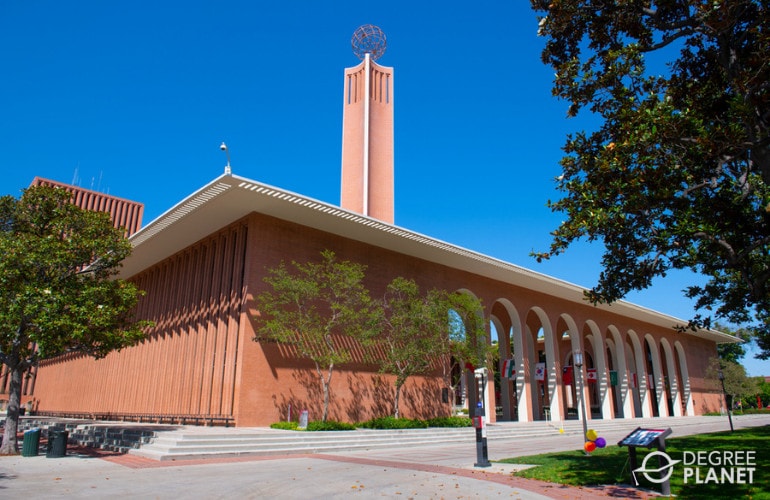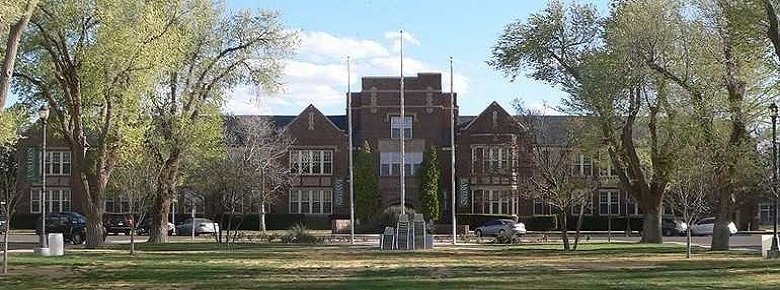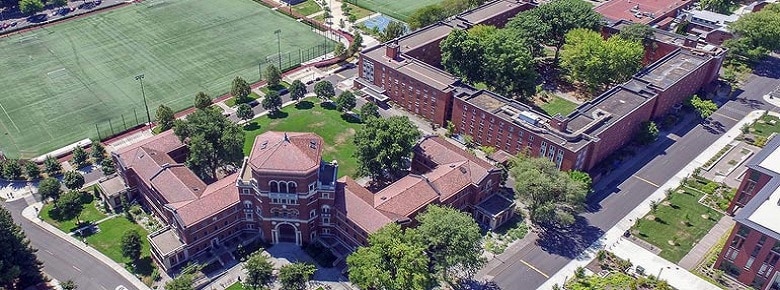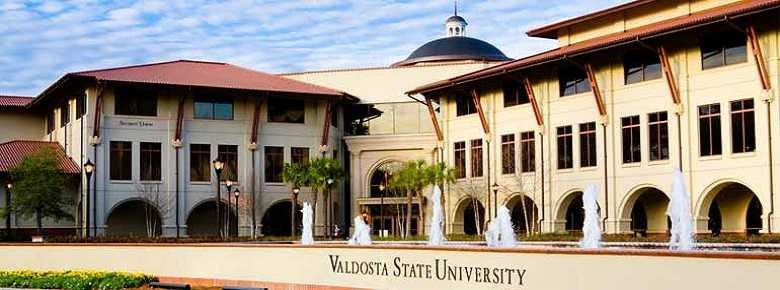Earning an online religious studies degree can provide opportunities to integrate your faith with your academic pursuits.

A bachelors in religion degree online program can also prepare you for a religious or service vocation. As you study theology and world religions, you can develop your critical thinking, writing, communication, and research skills.
Editorial Listing ShortCode:
Whether you enter a religious role or select another line of work, these versatile abilities can serve you well throughout your career.
Online Religious Studies Degrees

Faith can be deeply personal, but it also has far-reaching effects. In a religious studies program, you can explore matters of faith and theology related to your own religious tradition or religions from around the world.
The topics you typically study in this type of program include:
- Culture
- Ethics
- Humanities
- Old and New Testament
- Philosophy
- Religious practices
- Theology
At a secular college, your bachelors in religious studies is more likely to cover many different religious traditions from around the world. These often include Judaism, Christianity, Islam, Hinduism, and Buddhism.
Editorial Listing ShortCode:
At a faith-based university, a religious studies major may focus on the theology and practices of the school’s particular religious tradition. Concentrations are common in religious studies programs. Concentration options can include culture and public life, Biblical studies, theology, leadership, or Asian religions.
You may also be able to select quite a few electives for your program, which could allow you to shape the course of study around your interest areas. Religious studies graduates work in a wide variety of fields. Some become religious leaders, such as chaplains or Christian clergy members. Others work as writers, journalists, researchers, or nonprofit leaders.
This degree could also lead to graduate studies in a field like law, medicine, academia, counseling, social work, or archaeology.
Common Bachelor of Arts in Religious Studies Concentrations

Because religious studies is such a broad field, choosing a concentration for your major can help you tailor a program toward your goals. You’ll often share a core set of classes with every student in the religious studies program, but other courses will be specific to your concentration area.
Here are some examples of religious studies concentrations:
- Asian Religions. This concentration may explore religions like Buddhism, Hinduism, Daoism, Shinto, and Confucianism. It can also study related practices, like yoga and meditation.
- Biblical Studies. For this concentration, you can study the Old and New Testament and learn more about various types of literature in the Bible, including Pauline epistles, Hebrew prophets, and the parables of Jesus.
- Culture and Public Life. The focus of this concentration addresses how religion and society influence one another. You may consider ways that religious beliefs and practices are seen in television, movies, books, paintings, and other works of art.
- Leadership. If you want to be a clergy member or a nonprofit director, this concentration can help you develop the necessary leadership skills. The courses may address organizational structure and personal development.
- Theology. Often considered the study of God, the discipline of theology provides an academic approach to understanding religious beliefs and practices. Theology students often approach their studies from a particular faith perspective.
Concentration options can vary from one college to the next, so you may want to look around for the one that best matches what you hope to achieve with this major.
Religious Studies and Theology Careers & Salaries

A ministry career may be the first thing that comes to your mind when you consider religious studies. It’s true that some graduates of this program do become pastors, chaplains, or missionaries, but there are a variety of other jobs that might relate to this degree as well.
Some graduates go into nonprofit work in parachurch or community organizations. Some might participate in overseas humanitarian efforts. Jobs titles in these settings could include community services manager, grant writer, or project coordinator. Other graduates choose communications careers. For instance, they may work as authors or journalists, possibly writing or reporting on religious topics.
According to the Bureau of Labor Statistics, members of the clergy make a median annual salary of $51,940.
| Careers | Annual Median Salaries |
| Project Management Specialists | $77,420 |
| Postsecondary Philosophy and Religion Teachers | $76,160 |
| Social and Community Service Managers | $69,600 |
| Writers and Authors | $67,120 |
| Fundraisers | $59,610 |
| Clergy | $51,940 |
| News Analysts, Reporters, and Journalists | $49,300 |
| Substance Abuse, Behavioral Disorder, and Mental Health Counselors | $47,660 |
| Religious Activities and Education Directors | $45,110 |
| Social and Human Service Assistants | $35,960 |
Additional education is required for some of these roles. Graduates who are willing to continue their education may have further job opportunities. Master’s degree programs can help you qualify for positions in social work, marriage and family therapy, or mental health counseling. A number of universities offer both on-campus as well as online masters in religious studies.
Editorial Listing ShortCode:
Going to law school is another option. Religion graduates who go on to become lawyers may specialize in cases related to ethics or religious freedom. Graduate studies could also help someone qualify to work as a college religion professor or a researcher.
Religious Studies Bachelor’s Curriculum & Courses

For a religion degree, you may take classes related to history, literature, theology, leadership and other topics. Here are examples of courses you may take:
- American Religion: This class surveys the religious history of the United States, discusses how religion has shaped American culture over the years, and considers the country’s modern religious landscape.
- Biblical Theology: In a Christian theology course, you’ll explore the themes of the Bible and what the Bible teaches about God, humans, the world, and eternity.
- Church History: This course surveys the 2,000-year history of the Christian faith and covers key developments, like the early church councils and the Protestant Reformation.
- Ethics and Religion: As you discuss and debate ethical questions and moral dilemmas, you’ll explore ways that various religions have responded to those issues.
- Hebrew Bible: In an Old Testament class, you may read the Hebrew Bible and talk about the context and culture in which these books of history, law, poetry, and prophecy were written.
- Ministry Leadership: This class covers leadership skills, such as ethical decision-making and team development, for religious or nonprofit settings.
- Politics and Religion: You’ll take a look at the intersection of political practice and religious belief, particularly in the American context.
- Religions of Asia: In addition to the major religions of Hinduism and Buddhism, you may also learn about Shinto, Confucianism, and other Asian belief systems.
- Study of Religion: This class covers the ways that scholars have studied religions, both historically and in contemporary settings.
- Survey of Religion: An introductory course may address the fundamentals of religious study and provide an overview of major world religions.
Schools can vary greatly in their religion department curricula. Whether the college is religious or secular in nature may play a large role in shaping the curriculum choices.
Bachelor in Religious Studies Admissions Requirements

When applying to college, here’s what you may need to gather for the process:
- Essay or personal statement. This may address your life experiences, your faith journey, or your academic and career goals.
- Letters of reference. Reference letters may be written by teachers, work supervisors, or, in some cases, religious leaders.
- School transcripts. Postsecondary institutions require you to submit official transcripts from your high school and any colleges that you’ve previously attended.
- Standardized test scores. ACT or SAT scores may be requested by your prospective school, but these are not required at all colleges.
When compiling an application packet, it’s beneficial to be thorough and to turn everything in on time.
Online Religious Degrees Accreditation

Whether you choose a religious or secular school for your online degree in religious studies, it’s strategic to make sure that your institution holds regional accreditation.
Regional accreditation is the most highly regarded form of institutional accreditation in the US. The accreditation process evaluates whether colleges meet widely accepted standards for a thorough education.
Editorial Listing ShortCode:
Courses from regionally accredited colleges are often easier to transfer elsewhere. Having a regionally accredited degree may also be a requirement for getting into grad school or being hired for a job.
Religious Studies Licensure and Certifications
In religious vocations, the certification options vary based on the faith group and the professional role. If you plan to work as a Christian clergy member, you may need to become certified or ordained by your denominational leadership. Some denominations require graduate studies before ordination.
Certification is available for other jobs as well. For example, the Board of Chaplaincy Certification Inc. (BCCI) administers an interfaith credential for religious chaplains. Religion graduates who want to be counselors might need to hold state licensure. The requirements for becoming licensed can vary from state to state, but a graduate degree is necessary for certain therapy roles.
Financial Aid and Scholarships

Applying for various forms of financial assistance may help you cover some of the costs of your college degree.
To apply for government student aid, you can complete the Free Application for Federal Student Aid (FAFSA). You may discover that you qualify for low-interest loans or free grant money. These benefits are offered by your state as well as the federal government.
Scholarships can be another option. Some colleges offer scholarships as part of a financial aid package. You might also be able to supplement with additional scholarships from outside organizations, such as your church or denomination, a civic group, or a corporation. Sometimes, college tuition assistance is an employee benefit. You can check with your workplace to see whether you’re eligible for such a program.
Religious Studies Professional Organizations

You can build relationships with others in your line of work through membership in a professional organization, such as the ones listed below:
- American Academy of Religion (AAR)
- Association for the Study of Religion, Economics, and Culture (ASREC)
- Association of Youth Ministry Educators (AYME)
The perks of belonging to one of these groups can include local and national meetings, job boards, grant access, online libraries, professional discounts, scholarly journals, and more. There may also be opportunities to serve on committees or hold other leadership roles.
Can You Get a Degree in Religious Studies?

Yes, as a college student, you can major in religious studies. Both faith-based and secular schools offer degrees in religion. Your religious education may center around Christian studies, world religions, or the intersection of faith and culture.
You may study course topics like Old Testament studies, yoga practices, global religions, or ancient sacred texts. Religious studies students often choose a degree specialization. Depending on your school’s offerings, you might be able to choose a concentration like Bible and theology, art and culture, monotheistic religions, or Christian ministry leadership.
What Can You Do with a Bachelor’s in Religious Studies?
As a religion major, you could consider pursuing a clergy member position in your faith tradition. According to the Bureau of Labor Statistics, clergy members carry out faith practices and offer spiritual leadership for the people in their congregations.
Editorial Listing ShortCode:
You could also think about working in a nonprofit role. Both religious and community organizations need ethical workers and leaders who understand people’s values and concerns. Religion studies can also help you grow your communication skills. Some graduates pursue work as reporters or authors, often writing about spiritual matters or religion news.
How Long Does It Take to Get a Religious Studies Degree Online?

On campus, you may spend about 4 years earning a religious studies degree if you go to school full-time. Most on-campus programs follow a traditional 16 week semester system.
Online colleges often use an accelerated calendar so that earning a degree may only take 3 to 3.5 years to complete. This is the case whether it’s an online religious studies degree or an online theological degree program. With this accelerated academic calendar, you’d typically take one or two classes at a time, and each one might last 6 to 8 weeks. Back-to-back courses would run throughout the calendar year.
What’s the Difference Between a BA in Religious Studies vs. Theology?
Once you decide to pursue a college major related to matters of faith, you might debate between majoring in religious studies or theology.
| BA in Religious Studies | BA in Theology |
|
|
During a religious studies program, some of your courses might cover theology.
Is a Bachelor Degree in Religious Studies Worth It?

Yes, a bachelor degree in religious studies is worth it for many professionals. For those who care deeply about the influence of faith on people’s lives, this can be an intriguing field of study.
Editorial Listing ShortCode:
A degree in religious studies could point you toward an in-demand career. The Bureau of Labor Statistics predicts that jobs for social and community service managers will grow by 15% over the next decade. For substance abuse, behavioral disorder, and mental health counselors, the predicted growth rate is 23% (Bureau of Labor Statistics).
Universities Offering Online Bachelors in Religious Studies Degree Program
Methodology: The following school list is in alphabetical order. To be included, a college or university must be regionally accredited and offer degree programs online or in a hybrid format.

American Public University offers an online Bachelor of Arts in Religion program. It requires students to complete 120 credit hours, including a final capstone project, to graduate. Those interested in the program must submit an online application, copies of their government-issued ID, and proof of high school graduation.
APUS is accredited by the Higher Learning Commission.

Arizona State University offers a Bachelor of Arts in Religious Studies with an emphasis in Religion, Culture, and Public Life. All classes are 7.5 weeks long and offered online. A total of 120 credits are needed to graduate. Applicants must have a minimum GPA of 3.0 or equivalent ACT or SAT test scores.
Arizona State University is accredited by the Higher Learning Commission of the North Central Association of Colleges and Schools.

Eastern New Mexico University offers a Bachelor of Applied Art and Sciences with a concentration in Religion. To graduate, students must complete 120 credit hours, including two different concentrations. Applicants must submit official copies of their transcripts for all the schools they’ve attended and ACT or SAT test scores.
Eastern New Mexico University is accredited by the Higher Learning Commission.

Florida International University offers an online program for a Bachelor of Arts in Religious Studies. To graduate, students must complete 120 credit hours with a minimum grade of C in all religious studies courses. Those interested in the program must submit official ACT or SAT test scores and high school transcripts.
Florida International University is accredited by the Commission on Colleges of the Southern Association of Colleges and Schools.

Hampton University offers a Bachelor of Arts in Religious Studies. To graduate, students must complete 120 credit hours over the course of 4 years. To be eligible for the program, applicants must submit official high school transcripts or GED test scores, two letters of reference, and a personal statement.
Hampton University is accredited by the Southern Association of Colleges and Schools Commission on Colleges.

Kentucky Wesleyan College offers an online program for a Bachelor of Arts in Religion. To graduate, students must complete 120 credit hours. Those interested in the program must submit an online application with ACT or SAT test scores and either official high school transcripts or an equivalent degree.
Kentucky Wesleyan College is accredited by the Southern Association of Colleges and Schools Commission on Colleges.

Liberty University offers a Bachelor of Science in Religion. All classes are 8 weeks long and offered online. To graduate, students must complete 120 credit hours. Applicants must have a minimum GPA of 2.0 and must submit official transcripts from all schools attended to be eligible for the program.
Liberty University is accredited by the Southern Association of Colleges and Schools Commission on Colleges.

Louisiana State University offers an online program for a Bachelor of Arts in Religious Studies. Students must complete 120 credit hours, including 12 foreign language electives, to graduate. Those interested in the program must have a minimum high school GPA of 2.0 or an ACT score of 20 or higher.
Louisiana State University is accredited by the Southern Association of Colleges and Schools Commission on Colleges.

Missouri State University offers both a Bachelor of Science and a Bachelor of Arts in Religious Studies. Both degree programs allow students to add a concentration in Biblical Studies, Religion and Culture, Religions of Asia, or Religions of Europe and the Middle East. MSU automatically accepts applicants who have a GPA of 3.25 or higher.
Missouri State University is accredited by the Higher Learning Commission.

Oregon State University offers both a Bachelor of Science and a Bachelor of Arts in Religious Studies. To graduate with either degree, students must complete 180 quarter credit hours. Both programs are designed to allow students to complete a minor along with their major. Applicants must have a GPA of 3.0 or higher. ACT or SAT test scores are optional but encouraged by the program’s admissions department.
Oregon State University is accredited by the Northwest Commission on Colleges and Universities.

Saint Leo University offers a Bachelor of Arts in Religion. Students must complete 120 credit hours to graduate. Peer ministry opportunities, internships, and service trips are available for those in the program. Applicants must submit proof of high school graduation, standardized test scores, and official transcripts from all schools attended.
Saint Leo University is accredited by the Southern Association of Colleges and Schools Commission on Colleges.

St. Thomas University offers a Bachelor of Arts in Religious Studies. The program is designed for adult learners looking to return to school. All classes can be completed online. To be eligible for the program, applicants must have an associate’s degree and need to submit official transcripts.
St. Thomas University is accredited by the Southern Association of Colleges and Schools Commission on Colleges.

The University of Central Florida offers an online program for a Bachelor of Arts in Religion and Cultural Studies. Students must complete 120 credit hours to graduate. To be eligible for the program, applicants must have a high school GPA of 2.0 or higher and ACT and SAT test scores.
The University of Central Florida is accredited by the Southern Association of Colleges and Schools Commission on Colleges.

The University of Memphis offers a Bachelor of Liberal Studies in Religious Studies. To graduate, students must complete 120 credit hours and a senior project. To be eligible for the program, applicants must either submit official high school transcripts or self-report their GPA. ACT and SAT test scores must also be submitted to the school.
The University of Memphis is accredited by the Southern Association of Colleges and Schools Commission on Colleges.

Valdosta State University offers a Bachelor of Arts in Philosophy and Religious Studies. Students may choose to take the Philosophy track, the Religious Studies track, or the Dual track. Applicants must submit ACT or SAT test scores and high school transcripts to be eligible for the program.
Valdosta State University is accredited by the Southern Association of Colleges and Schools Commission on Colleges.
Getting Your Bachelor of Religious Studies Online

For those who care deeply about matters of faith—whether personal spiritual formation or the influence of religion on culture and societies—religious studies could be a fitting college degree to pursue.
In a religion program, you may study sacred texts, faith practices, theology, and leadership. You might also explore the intersection of religion with art or politics. Some accredited colleges also offer online programs for this field of study. In an accredited online program, whether it’s a online bachelors, online masters, or even an online PhD in Religious Studies, you can take informative classes, complete challenging assignments, and earn a respected degree.
You can start exploring online religion departments today to find the college that offers the best religious studies program for you.

